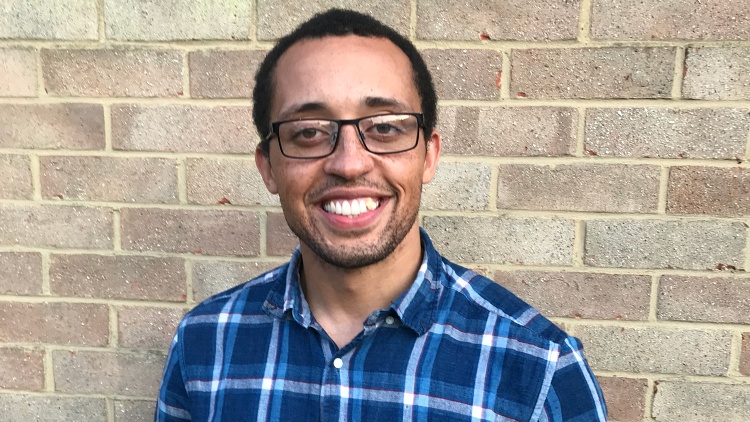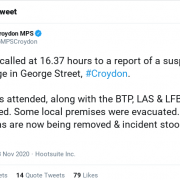
Over the past four weeks, EastLondonLines has examined different aspects of mental health under lockdown that might be causing people a problem alongside councillors from Hackney, Tower Hamlets and Lewisham. As lockdown restrictions are gradually being lifted, this week ELL discusses another aspect of mental health during the coronavirus pandemic with a therapist from Croydon – what might happen to us mentally after lockdown?
Joshua MacNab, 36 qualified as a therapist in 2018 and works at practices in both Croydon and Swindon.
He specialises in suicidal ideation and behaviour as well as bereavement and therapy for children. He combines a person-centred approach with psychodynamic counselling and transaction analysis which examines how people interact with others at different stages of their lives.
“This is such an unprecedented situation in a generation. This is a global collective trauma because we’re all experiencing the same thing. It’s like the same storm but we’re all sailing in different boats” says MacNab of the coronavirus pandemic.
He said that lockdown may have caused people to experience anxiety and depression, for some, maybe for the first time, which will damage people’s emotional well-being.
“I think not being able to be with loved ones, not being able to hold loved ones or to attend funerals and having birthdays in isolation, these are things we have taken for granted and suddenly we’re not able to do those things. It can bring about a lot of distress and create anxiety. For people with issues such as anxiety and depression before this lockdown, the potential is its been exacerbated over this time” says MacNab.
However, MacNab is positive about the future of the country’s mental health as he says that lockdown has forced us to focus on mental and emotional support more so than before with people in the community reaching out and supporting each other.
“I’ve seen a lot of new job roles created to work with people in need right now, but also to support them” he says.
McNab’s main concern surrounding the re-emergence of people into the world post lockdown is that the focus and momentum that has been gained when dealing with mental health problems will suddenly disappear.
“Before, we weren’t so focused on mental health. We took care of our physical health but mental health always seemed to be secondary, especially from a Governmental perspective. The amount of money poured into mental health is a fraction of what is brought into physical health, but there’s been a shift in focus on mental health over this time” he says.
For some people, emerging from lockdown will see their lives change dramatically. Sadly, some people may have lost loved ones, jobs and confidence throughout this pandemic. MacNab says that lockdown has brought about change for a lot of people and focusing on what can be affected as an individual going forward is key to progression.
“The priority then is to ensure that [people] can affect change when they can. One of the things as well is accepting what can and cannot change. This situation has brought about a lot of change in people and so it’s going to reset a lot of circumstances” he says.
MacNab urges anyone who is struggling mentally post lockdown, for whatever reason to reach out for support. He says that Government information lines and online counselling services are good places for many people to begin.
“This is going to be new territory for everybody, but I would say to seek out, to reach out. If you are struggling to get ahead absolutely [reach out] because there is professional support there. For people who have lost loved ones the pain is doubled because they weren’t there in the last minute, so there’s feelings of guilt” he says.

He also theorises that these feelings may have been exacerbated in the last few days as people may begin feeling as though they could have travelled to be with loved ones in a time of need in light of the actions of Chief Advisor to the Prime Minister, Dominic Cummings who drove 260 miles to County Durham to seek childcare during lockdown.
Government announcements are now coming in daily about how the country is gradually re-opening, with non-essential shops opening their doors on June 15 and the ability to now meet up to six people with social distancing rules in place being implemented. This new experience of social interactivity after over 2 months of isolation may cause some people anxiety according to MacNab, as he argues that physical distancing is likely something we will experience for some time to come.
“I highlight anxiety and depression because there’s so many people going through that and I think that going into the unknown is anxiety inducing in itself because we don’t know how we’re going to come out [of lockdown] or how it’s going to impact us.”
He says that change in life can bring about panic and concern for people suffering with anxiety which extends to changes in lockdown restrictions evaporating.
“It can bring catastrophising, talking about the worst and the worst possible consequences for going out, worrying about whether it’s too soon. It becomes about the psychic thoughts and it’s hard to break that kind of thought because it tugs at your worst fears and says it could be a reality. I think it’s important for people suffering with anxiety to ground themselves in the present” he says, elaborating that we need to accept that we don’t know what will happen tomorrow. Grounding ourselves in the present and being focused on our lives one day at a time is how he thinks we should proceed.
Another way in which people might be impacted after lockdown is if they have suffered a damaging trauma like domestic abuse or have found themselves in financial difficulty as a result of coronavirus. MacNab says that having memories of pain and hardship attached to this period may disturb people going forward. Identifying the origin of a trauma consciously is a positive step that can be managed alongside a therapist he says.
Despite his concerns about the unknown and the lasting effects of isolation, MacNab is confident that the lifting of lockdown restrictions will actually be good for the country’s mental health.
“This is a collective trauma and could have exacerbated things for people who were struggling with mental health, but we’ll be back. I think maybe returning to some regular life where we can go out and actually interact with people [is good]. We are a social species, it will be good for our mental health.”
MacNab says that ongoing support for each other is something we should aim to continue once lockdown is lifted.
“Reach out to people if you know they’re struggling or if you have an idea that they’re struggling then send a text to be in someone’s thoughts. It’s a very powerful action to listen to people. People are doing their best right now and it’s about keeping that up.”
MacNab cites free services such as the Samaritans as being a useful place for people to get the support they may need going forward.
Below is a list of resources that may be useful.




